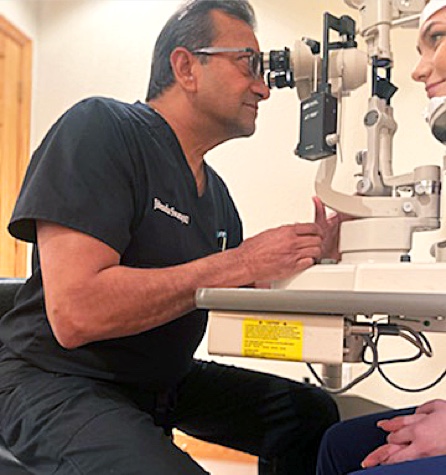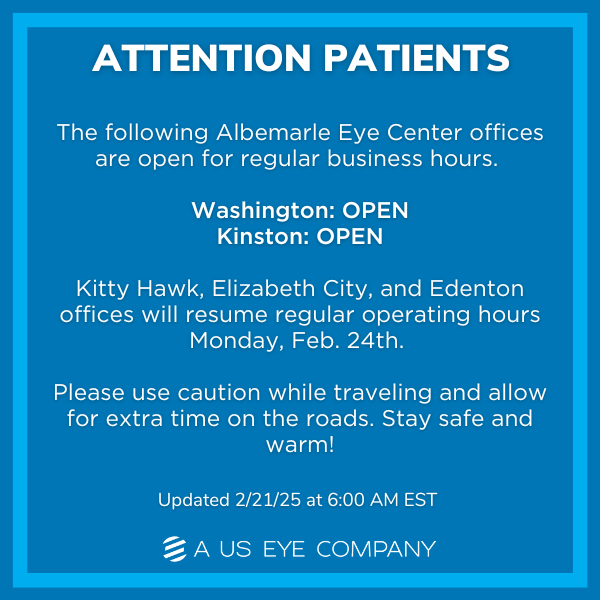Protecting Your Vision
As you age, the risk of developing eye diseases increases. Glaucoma is a group of eye conditions that damage the optic nerve and is one of the leading causes of blindness for people over the age of 60. It can occur at any age but is more common in older adults. Glaucoma can gradually damage your sight, so you may not notice a loss in vision until the disease has progressed to an advanced stage.
Our experienced team at Albemarle Eye Center understands how glaucoma can develop and affect your eyes and offers treatment to help protect your vision. If you have glaucoma or are at risk of developing it, contact us and book your glaucoma eye surgery appointment today.


All You Need to Know About Glaucoma
Glaucoma often progresses when the optic nerve has been irreversibly damaged, with different degrees of permanent vision loss. If left untreated, glaucoma can eventually lead to blindness.
Glaucoma develops when too much fluid pressure builds up inside the eye—this increase in eye pressure is called intraocular pressure. Intraocular pressure can damage the optic nerve that transmits images to the brain.
Without proper treatment, glaucoma can eventually cause blindness. A comprehensive eye exam with our experts can help detect even the slightest signs of glaucoma.
Types of Glaucoma
Glaucoma is a group of eye diseases that target your optic nerve. The optic nerve carries the information your retina receives to your brain, providing you with sight.
Determining which type of glaucoma you have is an essential step in treating the disease and preserving your sight. There are 2 main types of glaucoma.
Selective Laser Trabeculoplasty
Selective laser trabeculoplasty is the latest procedure in laser treatment for open-angle glaucoma and may be recommended for you by our glaucoma specialists at Albemarle Eye Center. SLT uses pulses of low-energy laser light to target and shrinks specific areas of the eye drainage system.
This process reduces pressure within your eye that can possibly cause lasting damage to the optic nerve and eventual loss of vision. The procedure takes about 10 to 15 minutes once the patient’s eye has been prepared.
Mild soreness and or swelling are expected inside the eye, but most patients resume normal activities immediately.
Trabeculoplasty
Trabeculoplasty is a laser procedure used to treat the most common type of glaucoma, primary open-angle glaucoma. Using a beam, your eye doctor modifies the drainage canal, allowing the fluids to drain effectively and help in controlling eye pressure.
This procedure is a slower process, and it may take 1 to 3 months for results to appear.
Iridotomy
Laser Iridotomy is primarily used on patients with a narrow-angle or closed-angle problem where the iris blocks normal fluid drainage. Your eye doctor will use an instrument to create a tiny hole in the iris to effectively restore normal drainage.
Following the procedure, you may experience a temporary blurriness of vision, and anti-inflammatory eye drops are usually prescribed for a few days.
Glaucoma Treatment Options
Although there is no cure for glaucoma, at Albemarle Eye Center our experienced team offers several treatment options. We start with diagnostic technology to determine what type of glaucoma you have and what treatment method is best for you.
Our team may opt to begin with prescribing eye drops or oral medications and move on to other treatments depending on the severity of your glaucoma.
Open-Angle Glaucoma
Open-angle glaucoma is the most common form of the eye disease. The structures of your eye may appear normal, but fluid in the eye will not be flowing properly through the drain of the eye, also called the trabecular meshwork, resulting in a blockage.
This blockage of fluid causes pressure in the eye to increase and damages the optic nerve gradually. This process occurs slowly, and you may lose your vision before you are even aware of any issues.
Angle-Closure Glaucoma
This type of glaucoma is less common and can cause a sudden pressure buildup in the eye. Angle-closure glaucoma occurs when the iris bulges forward to narrow or block the drainage angle formed by the cornea and iris. The result is an inability for fluid to circulate through the eye, and pressure can increase.
Angle-closure glaucoma can occur suddenly or gradually, and acute angle-closure glaucoma qualifies as a medical emergency.

Managing Glaucoma
Glaucoma is one of the most common eye diseases that adults can develop with age. From laser treatment for glaucoma to open-angle glaucoma surgery, there are many methods to protect and preserve your vision. At Albemarle Eye Center, we’re here to assist you with all your glaucoma treatment needs.
Book an appointment and begin the fight against glaucoma today.
Our Locations
Our Services

Albemarle Clinical Trials
At Albemarle Eye Center, our research department continues to take part in numerous FDA-monitored clinical trials.
Our advanced eye care center is committed to improving ocular health, which is why we’re always on the search for new treatment options, medications, and medical devices that can benefit our patients


We are a proud partner of US Eye, a leading group of patient-centric, vertically integrated multi-specialty physician practices providing patients with care in ophthalmology, optometry, dermatology and cosmetic facial surgery.














